ChickenZen: The Sequel
by Dr. Malle Carrasco-Harris, Programs Manager
Mrs. Fitzgibbons stands hollering on stacked cinder blocks in front of the blowing fan, creating a ruckus on this warm summer morning. I’m wishing for the umpteenth time in the past four years she would take it down just a notch. Fitzy pivots, her feathers blowing erratically in the breeze of the fan. She faces the fan again with beak open to gulp air before hopping down. Just another day of carefree chicken antics in my backyard.
If you have been receiving our newsletter for a while, you may recall my flock of “Corona Chickens.” Despite being extra work and responsibility, my ladies ground me in the seasons, provide enrichment with their quirky behavior, and let me get my hands dirty.
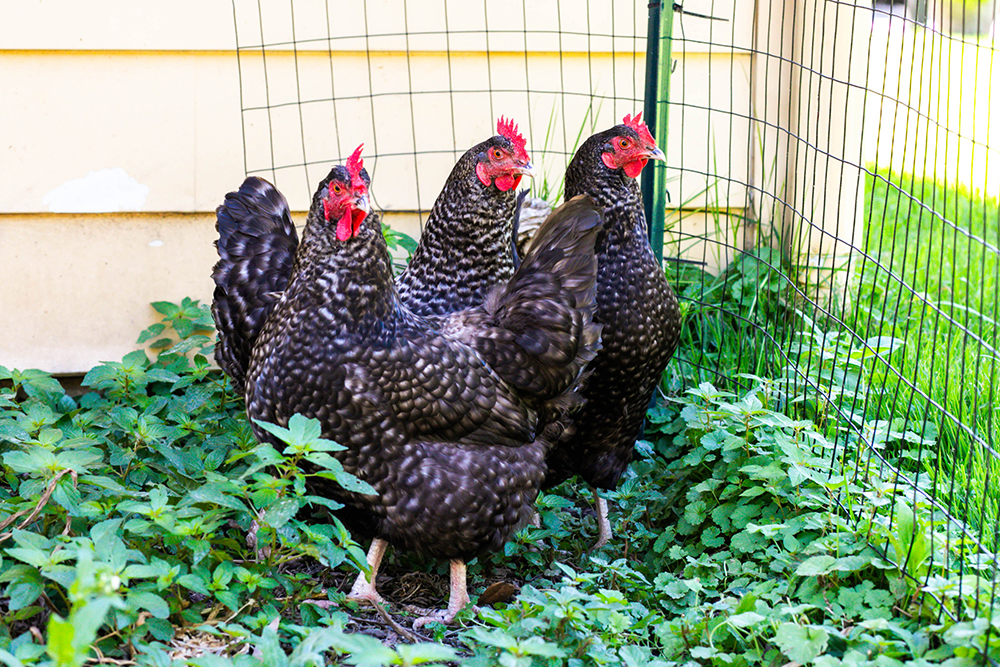
Calendar and Cuisine
We’re all on a journey around the sun, leading to changing seasons and natural times of productivity and rest. Working a mostly indoor job, it’s easy for me to ignore my biological clock. The ladies don’t have computers or cellphones, so they follow their bodies’ cues as the seasons change.
With long summer days, the chickens have ample time to eat and produce eggs (ever wonder why so many wild birds head up to Canada for the summer?). My summer cuisine features pesto scramble, quiche with garden thyme and tomatoes, and lemon cookies fluffed light by extra eggs. Poached “cackleberries” over homemade sourdough are a morning staple.
The summer heat also triggers broodiness in some hens, leading to amusing yet challenging behaviors. Brooding is a natural, hormonally driven behavior to sit on eggs in order to hatch them. Claire is apparently a bit too carefree, but Mrs. Fitzgibbons takes her egg incubation duties quite seriously. She is a terror when broody: fluffed feathers, staccato clucks, aggressive pecks at any hand that dares to reach into the nest box. Even her strut means business. She is sentenced to at least three days of chicken jail each time until she can regain her (hormonal) composure.
As the days get shorter, the chickens herd themselves into the coop earlier each evening, cease egg production, and begin losing feathers. Molting is when birds replace old, tattered feathers, yet Fitz has often procrastinated at this task. She nearly became freezer fowl during one ice storm but for a last-minute purchase of a heat lamp. While artificial light could boost egg production in the winter, I opt for a more natural approach, inspired by a fellow chickenkeeper’s compassionate perspective. Haven’t our ladies earned a break to focus on their needs? Instead, I substitute flax-meal for eggs in my oatmeal cookies, top my toast with nut butter, and pivot to porridge.
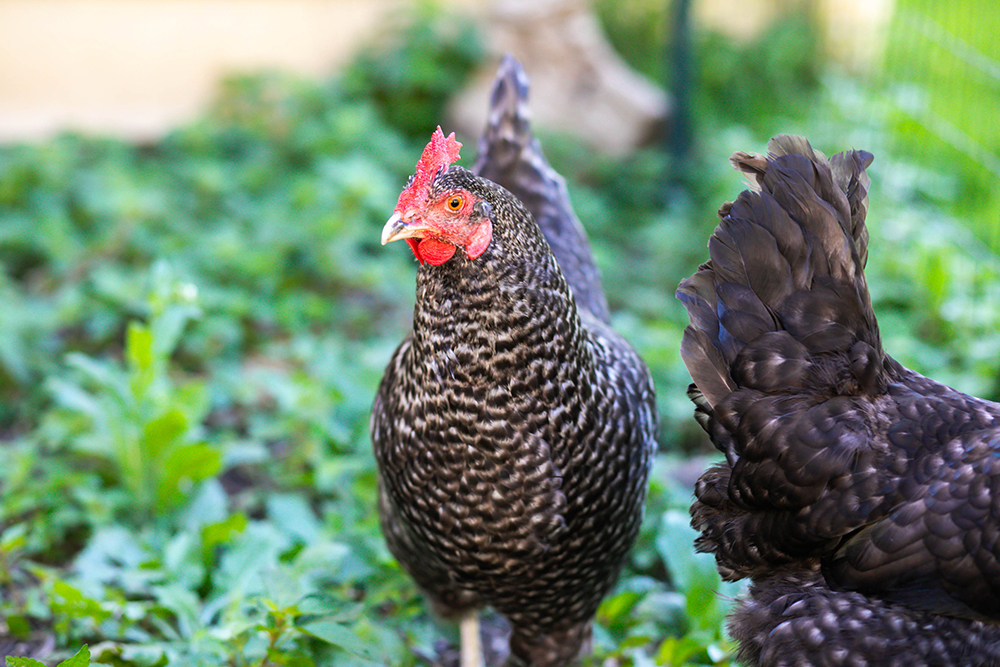
The Pecking Order is Real
I’ve come out with a mix of mealworms and seeds. Chubby Claire zooms around the corner, her heft and curiosity distinguishing her. Janet still generally keeps a safe distance, eyeing me nervously. Mrs. Fitzgibbons is the ringleader of this troop, but generally found between Claire and Janet.
After four laying seasons, my mature ladies have slowed egg production, but that doesn’t mean the chicken chores have gotten lighter: the poop in the coop must be scooped! So, I threw a wrench into their comfortable pecking order by expanding my flock to make sure my attentions were still paying off for our household kitchen.
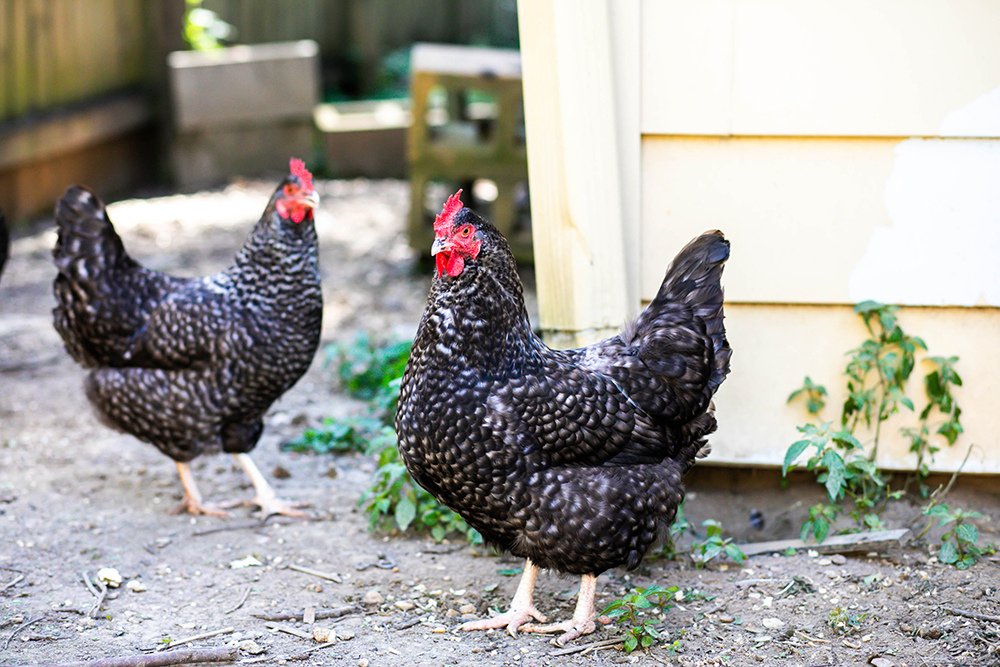
We were binging the Outlander TV series when we picked up our first pullets, and we’re currently some of the millions watching Bridgerton. You can guess what’s coming next. Perhaps our two new hens would be Penelope and Eloise if they seemed particularly clever, or Queen Charlotte and Lady Danbury if they were bold.
Within days, it was clear I had a Queen Charlotte. She escaped the first afternoon from her quarantine pen. The second day, she berated the neighborhood with a choking crow: we had moved from “denial” into “anger,” if we’re following the chicken stages of grief. Cold watermelon rinds nudged us towards “acceptance” by Day 3.
Her sister was content yet slightly anxious, but she was enjoying the swing hung in their temporary pen! She became our Lady Danbury since she would occasionally jab at Queen Charlotte.
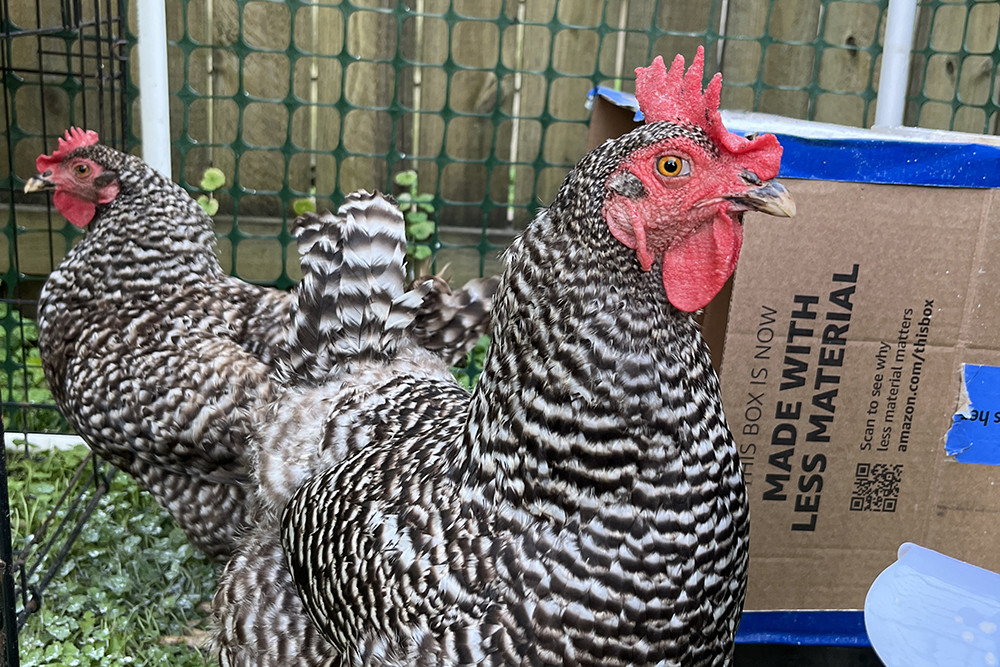
Upon the newcomers’ release into the wider pen, Fitzy slinked over to explain who ran the show. An emboldened Lady Danbury started a short-lived kerfuffle. Queen Charlotte briefly pecked her down from that attempted coup, but appeared too uninterested to engage herself. I watched as she explored the larger area. Could this be her new kingdom? The old ladies were thrown off. They plotted their next move while keeping suspicious eyes on the newcomers. Having inspected the four corners of the pen, Charlotte approached the three. She stood boldly with an unwavering stare. Fitz knew this was her time. She stepped forward to accept the challenge.
The fight that commenced was a surprise to me! This was something wholly different from mild jabs at feeding time. They approached like matadors in a bullfight, chest and neck puffed to look large and intimidating. What followed were frantic wing flaps, comb grabs, and energetic attempts to topple the other.
I let them work it out for a brief period before stepping in. I was anxious. Would this happen again? Did they need to remain separated longer? Our Stewardship Manager Fields comforted me, sharing her wisdom from years as a zookeeper: just because you don’t know who won doesn’t mean they don’t. Well y’all, Fitzgibbons is adjusting to being unseated from her lofty perch!
Seeing the changes above, Claire and Janet apparently hatched a plan: neither one would be at the bottom of the new pecking order if they could help it. These two dug deep down into their gentle, content spirits and found their inner bullies! They’re no match for Queen Charlotte, so they focus their energies on Lady Danbury.
Her initial bold behavior was fleeting. With more time, the others saw her as she truly was: just a scared, skinny bird. I catch her being run off, sometimes for what looks like no apparent reason. She is now rather clever about when and how she approaches me or the food pail.
The name wasn’t a good fit (fans know this), but which Bridgerton character was? The show is full of strong, empowered female characters. Cressida. It had to be her: Ms. Cowper is one of the loneliest and least liked characters in the show.
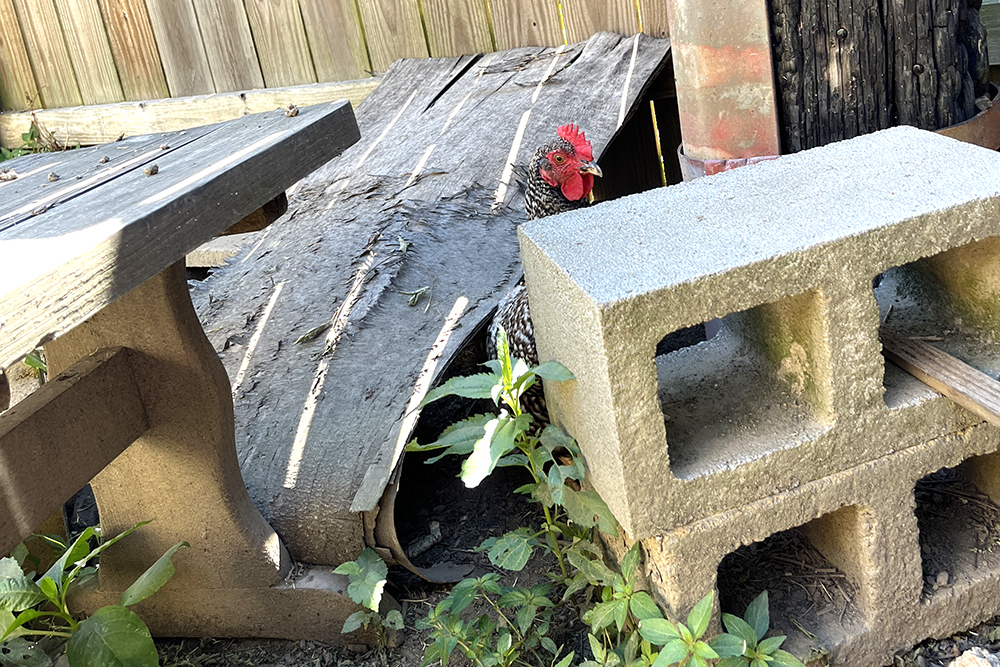
The integration feels like watching middle schoolers in a cafeteria vying for their place in the social order. I really do hope that our ladies will warm up to each other over time. Chickens are empathetic creatures and they need a flock to meet their social needs.
It reminds me that we humans are also highly social and empathetic creatures. Who are we ignoring, rejecting, or mistreating because of their differences or status? Cressida may have her quirks, but when I close her pen at night (she sleeps separate from the others) she softly coos into the twilight. Perhaps that’s her attempt to make a connection with anyone, even a featherless friend.
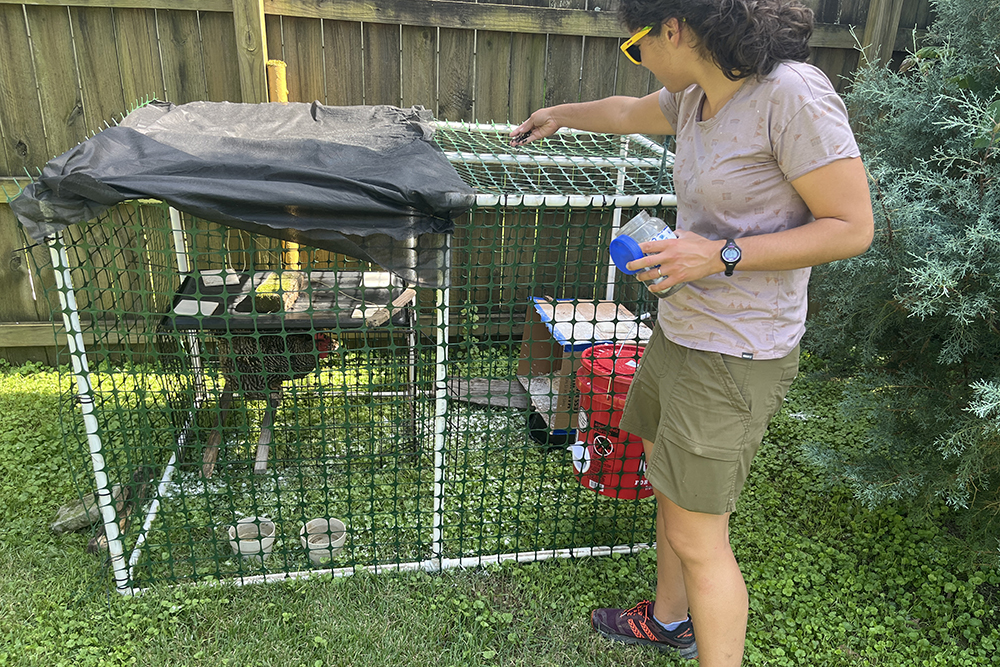
A Little Dirt Won’t Hurt
At the crack of dawn every day I head out to tend to the ladies’ needs, pick tomatoes and cucumbers, turn the compost, and wonder at the pink threads of sunrise over the rooftops. These morning routines help me feel like I’m sliding in a piece of the “Malle puzzle.”
Gardening and maintaining my backyard flock are honest work, a humble nod to the first agriculturists from the Neolithic Revolution. Humans began domesticating fowl and other animals soon after they started farming. Many of these creatures remain popular in our modern society, making appearances in nursery toys, religious artwork, and pop culture. I imagine having some connection to the land and creatures is within all our genes despite our differences.
I don’t mind dirt under my fingernails or the bead of sweat rolling down my back (I’d prefer fewer mosquito bites!). Dirt work cultivates stewardship towards my little piece of Memphis. My husband may argue that it makes me reluctant to even imagine moving. Why, the ladies have a nice sized plot of their own, the tree we planted is too young, and only I know that those perennial coneflowers were a gift from my neighbor.
Having an urban flock provides me with an entertaining connection to the earth. Perhaps you can relate to this in your own backyard, apartment windowsill, or favorite public green space. At the Conservancy, I’m tasked with helping develop people’s connection to this invaluable public park. If you would like to cultivate a bit of stewardship outdoors, why not start with us? We’re launching a Volunteer Ranger Program to help us continue our mission of providing a welcoming place for all while deepening connections to Overton Park. You can learn more and sign up for our upcoming information session here. These shifts will be a lot easier than having hens!
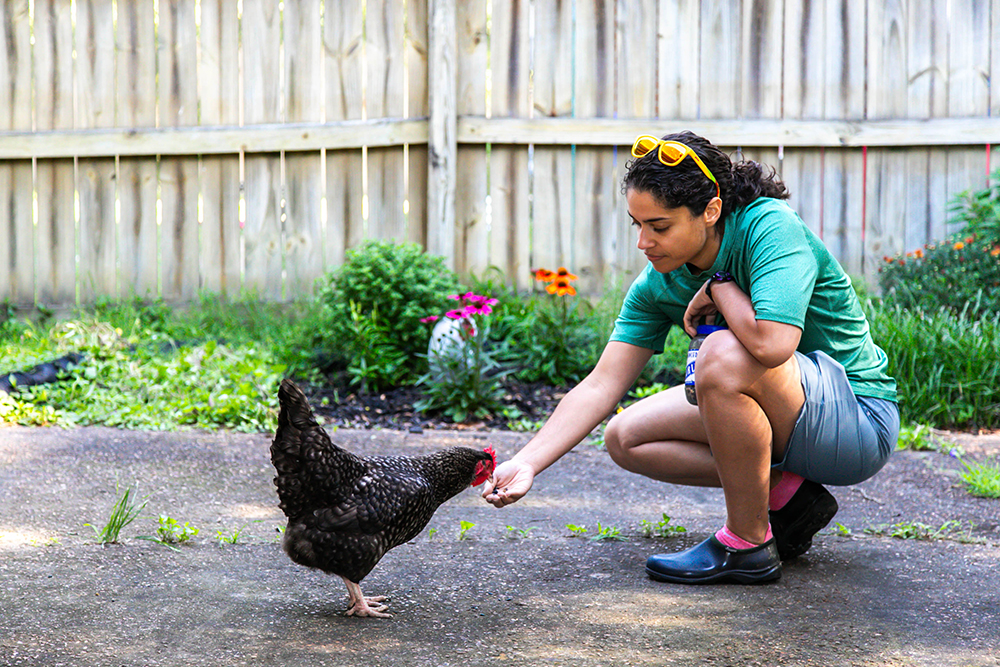
NatureZen is a regular series of dispatches from Conservancy staff members about our interactions with nature. Sign up here to get them in your inbox.



